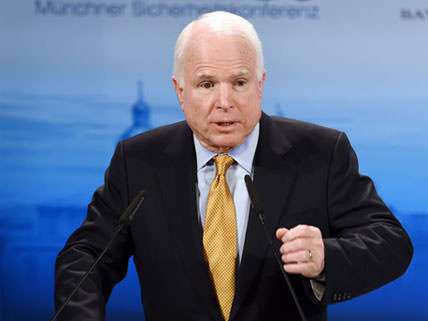Even Fake Fiscal Restraint Is Too Much for the GOP's Defense Hawks

For a sense of what the debate over military spending looks like within much of the Republican party, it's worth going back a few weeks to a letter written by House Armed Services Committee Chairman Rep. Mac Thornberry.
The letter, which was co-signed by 30 other House Republicans, urged House Budget Committee Chairman Tom Price to blow through the sequestration caps that have placed modest—and already broken—limits on the defense budget, preferably this year, and certainly next. The message was clear: End those pesky spending restraints, the sooner the better.
Even that wasn't enough for some House defense hawks, however. Rep. Randy Forbes, who heads the "seapower and power projection" subcommittee, declined to sign the letter because, according to Breaking Defense, "the amounts Thornberry and co. requested were not high enough."
This is the sort of pressure that Rep. Price was facing in the run-up to the release of this year's House GOP budget plan.
So at first glance you might think it admirable that the proposal, released this week, sticks to the sequestration spending caps.
Except, of course, that it doesn't. Not really.
Oh sure, it technically adheres to the caps, but it lards the defense budget through an obvious workaround, by putting a whopping $94 billion into the Overseas Contingency Operations (OCO) fund, the "emergency" slush fund for war operations. As a comparison, that's $36 billion more than what President Obama requested in the White House budget this year. It's also $43 billion more than the $50.9 billion requested by Thornberry and his fellow hawks.
It's not only an obvious gimmick, however—it's an obvious gimmick that is built to lead to even more defense spending gimmicks in the future. As Politico notes, the proposal sets up a dramatic drop in OCO spending the following fiscal year, dropping it down to $27 billion. That makes the budget look leaner going forward, but it's not terribly plausible, except as a setup for another emergency-spending end run around the sequestration caps. It's a path to permanently ditching the sequestration restraints even while pretending not to.
And yet that still doesn't work for Sen. John McCain (R-Az.), who has suggested he would not support a budget that didn't increase defense spending. "I don't like it because OCO is a gimmick," he said of the plan, according to National Journal. For the party's most outspoken defense hawks, it seems, even pretend fiscal restraint is too much to bear.


Show Comments (54)